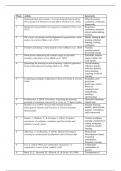Samenvatting
Summary - Learning in Organizations (master)
- Vak
- Instelling
The following document is made when following the course learning in organizations from the study of educational sciences at Utrecht University. It entails a summary of the articles which are mandatory for the exam. I hope I can help people understand the articles in a no-nonsense way and help them...
[Meer zien]



